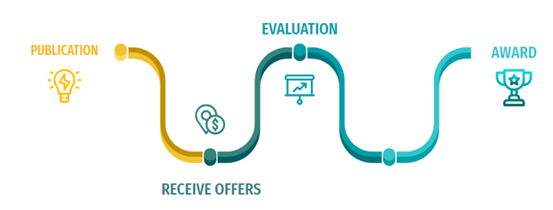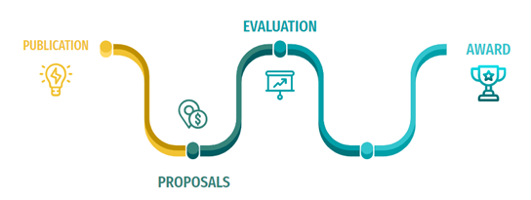







Here you will find guidance, tutorials and all necessary information to do business.
Fusion for Energy (F4E) is the European Union's joint undertaking for ITER and the development of fusion energy. Our members include the 27 European Union (EU) Member States.
Our role is to provide Europe's in-kind and in-cash contribution to ITER, the world's largest scientific installation that aims to demonstrate fusion as a viable and sustainable source of energy. The seven parties of the project, including the EU, Russia, Japan, China, India, South Korea and the United States, represent half of the world's population and 80% of the global GDP.
F4E also supports international fusion research and development initiatives through the Broader Approach (BA) Agreement signed with Japan and in cooperation with the European fusion research community (EUROfusion), with the goal of reaching the commercial exploitation of fusion energy.
To achieve our goals, we work closely with industry and R&D organizations across Europe to design, manufacture, and test technical components for fusion installations. We also collaborate with external contractors for commodities, materials, equipment, and other items required for the support, management, and administration of the institution.
F4E publishes various procedures on its website and industry portal, which cater to different types of entities based on the nature of the process.
Here is a brief description of the different collaboration and business opportunities that your institution or company may be interested in:
F4E may require external highly specialized experts to assist in technical activities. For this purpose, F4E publishes Calls for Expression of Interest (CEI) regularly to select experts. Every CEI contains the selection criteria, required expertise, and model contract containing the conditions of remuneration.
Only natural persons can apply for the CEI, in order to be included in a prospective list of individual experts who may be called upon to perform tasks for which their expertise is suited. This list, containing the selected experts, is valid for 5 years. When required, F4E will select an expert from the validated expert list.
Experts are not F4E members of staff, they do not have an employment contract with F4E and are not a replacement for F4E staff members in any circumstance. Their tasks related to their appointment will be strictly defined in the expert contract. They might be of any nationality and not only EU citizenship.
How to apply?
A CEI is published in the Official Journal of the European Union (OJEU) and on the F4E website. The CEI provides all the necessary information about the required expertise, profiles, the scope of tasks to be performed, selection and award criteria, and general rules for selecting and appointing experts. If you wish to apply, you need to register via the link and fill out the form.
Only experts with at least 5 years of relevant specific work experience (after obtaining a university degree) and meeting the minimum level of capacities requested should apply. CEIs are open for a maximum period of five years; therefore, applications may be submitted up to 3 months before the end of their validity.
Exceptionally, a specific CEI is published on a particular domain (E.g. Adjudicators)
Applications for CEI shall be completed and submitted online. Apply here.
For any queries or doubts, please contact f4e-experts@f4e.europa.eu.
ITER Calls are collaboration opportunities that arise within the ITER Organization. These calls are open to companies from F4E member states who can provide the required goods or services for the ITER project. These calls aim to address the specific needs of ITER, allowing companies to contribute their knowledge and support in various areas, engaging directly with the ITER Organization and assisting in fulfilling its objectives.
Call for Tender: A Call for Tender is a process through which ITER solicit bids or proposals from interested suppliers or contractors within the territory of its Domestic Agencies to provide goods, services, or works. The candidates proposed by F4E must be established in the territory of an F4E Member and have work experience, expertise, competence, and references suitable for the nature of the particular Call for Tender (CfT). The ITER Organization will then invite them to prequalify for the respective CfT. Suitable candidates shall express their interest by filling in a Company Info Template for each of the published Call for Tender and sending it to ITER-Calls@f4e.europa.eu. F4E will then prepare a list with the companies eligible which will be invited to prequalify by the ITER organization. You may find the latest CfN published, as well as all the information needed for application, here in our industry portal.
Call for Expertise (CFE): A call for expertise is a process through which ITER seeks to engage directly with external experts or organizations to provide specialized knowledge or advice in a specific area. It is typically used when ITER requires expert input, consultation, or review of technical, scientific, or operational matters. The call for expertise aims to identify and select individuals or organizations with relevant expertise and experience to contribute to the specific needs of ITER. The candidates shall send the application directly to the IO Procurement Officer in charge of the call indicated in the Expression of Interest form which can be found on the dedicated website.
ITER - Open Tender (OT): An open tender is a competitive procurement process used by ITER to solicit bids or proposals from interested suppliers or contractors to provide goods, services, or works. It is typically used when ITER needs to acquire specific products, equipment, construction services, or other contractual services. The candidates shall send the application directly to the IO Procurement Officer in charge of the call indicated in the Expression of Interest form which can be found on the dedicated website.
Once ITER has received your expression of interest, you will be invited to participate via their procurement portal I-PROC based on the SAP Ariba solution. If you are not yet registered with ITER on I-PROC, please use the below link to submit your “Self-Supplier Request” form:
IProc(ariba.com)
The ITER team will check the data and have the Ariba system send you an invitation email to further complete your registration.
ITER Market Surveys: An ITER Market Survey is not exactly a call but a survey published by ITER to evaluate the market situation and to identify candidate suppliers having the interest, knowledge and capacity related to the supply of specific products or services. The details for participation in an ITER Market Survey are published on a dedicated website.
Pre-procurement activities are essential in any procurement process, and F4E engages in several activities to gather information about the market and establish its procurement strategy. These activities include market surveys, information days, contacts with the Industry Liaison Officer (ILO) network, direct contacts with companies, registered companies databases, and prior information CfT announcements.
Market surveys are the most frequently performed activity and have more weight in the preparatory activities of a procurement process. Market surveys enable F4E to establish the parameters of a procurement action from a quantitative and qualitative point of view. Market surveys help to acquire more detailed information about European industries operating in a given market, identify potential commercial and technical risks associated with a specific procurement strategy, check technical and/or commercial assumptions, facilitate the setting up of consortia agreements among potential bidders, provide input concerning potential selection criteria, and publish the incoming procurement opportunity to relevant market actors.
How to participate?
Market surveys are carried out using EU Survey and are announced through the F4E Industry Portal. Participation in market surveys is voluntary. Not participating in a specific market survey does not prevent an economic operator to participate in a related tendering process. The outcome of the market survey helps F4E taking an informed decision about the existing market conditions of F4E’s supply chain and of the available skills/technologies for establishing its procurement strategy.
Ongoing and past market surveys can be found at the following link.
Info Days are also carried out from time to time. Information days are meetings organized to present to the European Industries and laboratories a specific upcoming business opportunity in a given technical domain.
Information days serve to raise awareness, understanding and interest in an F4E procurement opportunity facilitating, where necessary, the creation of consortia capable of successfully responding to complex requirements, all with the final aim to improve the number and quality of the offers which will be submitted in response to F4E’s call. At the same time, an information day is a way for F4E to collect additional information concerning the level of competition, technical capability and professional experience existing in the relevant market, as well as to receive feedback on the intended/defined procurement strategy to be able to identify, in due time, any potential commercial and technical risks that will help to complete the assessment of the relevant market.
How to participate?
Info Days are announced through the F4E Industry Portal including indications for companies to register. To facilitate the attendance of SMEs by reducing costs and having regard to the implementation of video conferencing solutions, virtual Info Days are favoured. Not participating in a specific info day does not prevent an economic operator to participate in a related tendering process.
Ongoing and past Info Days can be found at the following link.
Procurement is the purchase of goods, services or works by public bodies (such as F4E).
It involves contracts for pecuniary interest, concluded between economic operators and F4E intended to obtain the supply of assets, the execution of works or the provision of services: in the case of a contract, F4E obtains a product or service it needs in return for payment of an agreed price.
Depending on the scope of the contract we can distinguish between:
Administrative Contracts:
Administrative Contracts are awarded to obtain the supply of assets, the execution of works or the provision of services to support the administrative set-up and functioning of F4E. For instance: contracts for IT equipment, office furniture, information and communication campaigns, training courses, legal support, publications, accessing databases, organising conferences, etc.
Operational Contracts:
Operational Contracts are awarded to obtain the supply of assets, the execution of works or the provision of services for the implementation of the F4E's international tasks related to the construction of ITER and the implementation of the Broader Approach and Demo. For instance: design, manufacturing, testing, assembling, etc.
F4E follows the principles and procedures established in the EU Public Procurement, which requires fair, transparent, and non-discriminatory treatment of all tenderers and the use of objective and measurable criteria for the award of contracts
You may check open CfTs and submit your tender at the following link.
F4E's procurement processes are announced via ex-ante publicity of CfT on the F4E industry portal, F4E website and Official Journal of the European Union (OJEU). The call for tenders will include general information about the needs to be supplied, requirements, deadlines, and documentation. Tenders must be submitted via the e-tendering tool. After the evaluation of offers and a decision on the winning offer has been made through the corresponding evaluation process, the award notice will be published. Any contract amendments or significant changes will also be published. Additionally, an annual report of the contracts signed throughout the period will be published, available at the following link, under the section “List of Contracts”.
Contracts are awarded according to EU regulations. F4E public tender procedures can take one of the following forms: open procedure, restricted procedure, negotiated procedure, competitive dialogue, competitive procedure with negotiation and innovation partnership.
Open Procedure:
The open procedure is the most widely used at F4E and is open to any interested economic operator who can prove their capacity to fulfil the requirements set for each specific CfT. Tenders are evaluated on the basis of the criteria published upfront (publication of a contract notice in the EU Official Journal, F4E Industry Portal and EU Supply).
Negotiations are not allowed under this procedure.

Restricted Procedure:
The restricted procedure is a two-step process:
In the first step, interested economic operators are invited to express their interest in the contract (Requests to Participate – RtP) and, based on technical and financial capabilities published upfront (via publication of a contract notice in the EU Official Journal, F4E Industry Portal and EU Supply), a number of companies are selected and invited to participate in the following step.
In the second step, a restricted number of candidates are invited to submit tenders. Tenders are then evaluated based on the criteria published upfront in the contract notice.
Negotiations are not allowed under this procedure. A minimum of five companies should be invited.

Negotiated Procedure:
The negotiated procedure is a one-step process where F4E directly invites companies to submit their tenders. The purpose of the negotiation is to improve the content of the tender or to adapt it to the requirements set out in the procurement documents. However, it's important to note that the minimum requirements and evaluation criteria specified in the procurement documents cannot be modified during the negotiation process. Only the aspects that are not defined as minimum requirements in the tender specifications may be negotiated.
For middle to low-value contracts below the directive thresholds (€140k in 2023), a simplified negotiated procedure in one step may be used. In this case, F4E publishes a short prior information notice on the industry portal, inviting companies to submit their interests. The number of candidates invited to submit their tender will depend on the estimated value of the contract, with a minimum of one candidate for very low-value contracts (€1k-15k), three candidates for low-value contracts (€15k-60k), and five candidates for middle-value contracts (€60k-140k).
For contracts with a value above the directive threshold, a negotiated procedure can also be used in exceptional circumstances defined under point 11 of Annex I of the General Financial Regulation (GFR). This procedure allows F4E to invite economic operators of its choice (generally only one) to submit tenders without prior publication, for specific types of purchases or circumstances such as monopolistic situations, IP protection conditions, or absence of market availability. However, the selected economic operators must meet the exclusion and selection criteria and negotiate the terms of the contract with F4E.

Competitive Procedure with Negotiation:
This procedure may be used only in specific cases defined in point 12 of Annex I of the GFR. [2]
The competitive procedure with negotiation is a procurement procedure that is used in specific cases where negotiations are allowed. The procedure involves two steps:
In the first step, a contract notice is published in the OJEU, and economic operators are selected based on their technical and financial capabilities.
In the second step, only the selected candidates are invited to submit their tender and, if necessary, engage in further negotiations. The tenders are then evaluated based on the criteria published upfront.

Competitive Dialogue:
The competitive dialogue procedure is a multi-stage process that allows F4E to conduct a dialogue with economic operators to identify and define the best possible solution for its needs. It is used when F4E is unable to determine the means of meeting its needs or assess what the market can offer in terms of technical, financial, or legal solutions. This procedure can only be used in specific cases defined in point 12 of Annex I of the GFR. The competitive dialogue procedure consists of three stages:

Innovation Partnership:
The innovation partnership procedure is used for highly complex and innovative contracts where economic operators will be involved in developing new products, services, or works that F4E will subsequently purchase under certain conditions. It is imperative that the product is not currently available in the market or near the commercialisation phase.
This two-step procedure involves signing a framework agreement with at least three partners, followed by structured phases that correspond to the various steps of the research and innovation process. As the product development advances, the number of partners is reduced.

Grants are a form of direct financial contribution from F4E to external collaborators for the purpose of achieving scientific and technological research and development activities related to ITER construction, Broader Approach, DEMO, and other facilities that support F4E's objectives. These grants are given under the principles of non-profit and cooperation for a shared interest.
Grants are used to support R&D activities at shared costs with the beneficiaries, and ownership and use of results remain with the beneficiaries with free access for F4E. Intellectual property ownership remains with the beneficiary, as do ownership of procured items, and reciprocal liability is waived.
F4E launches a Call for Proposals (CfP) to search for suitable candidates who can perform the specified tasks. These CfP are published on F4E's Industry Portal, and any European-based entity that meets the minimum requirements can apply and be evaluated. Each published CfP contains general information and minimum requirements that entities must comply with.
There are two types of grant procedures: open call for proposals and unique beneficiary.
In an open call for proposals, any individual may apply.

In a unique beneficiary procedure, only a preselected candidate with specific capabilities and requirements for the procedure will be invited to submit a proposal.

How to apply?
F4E announces grant processes via ex-ante publicity of CfP on its Industry Portal. These announcements contain general information about the needs to be supplied, requirements, deadlines, and documentation.